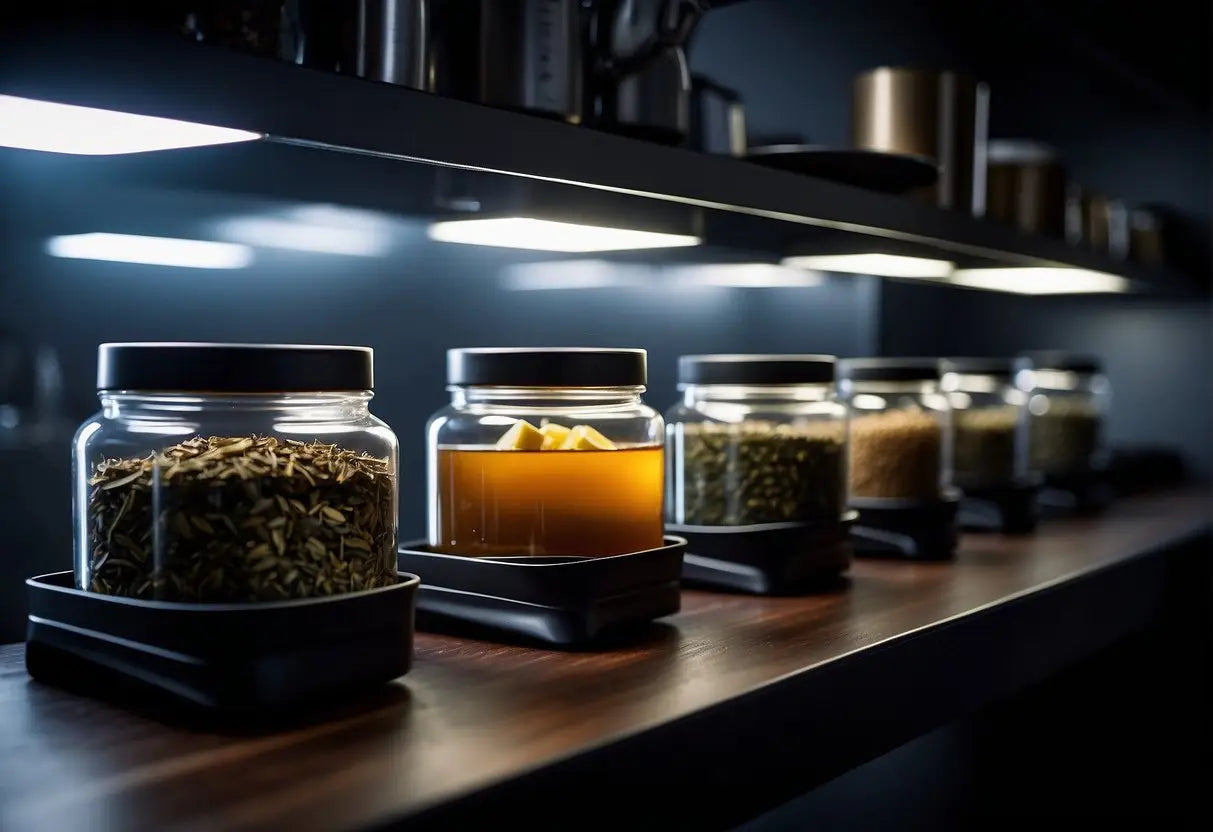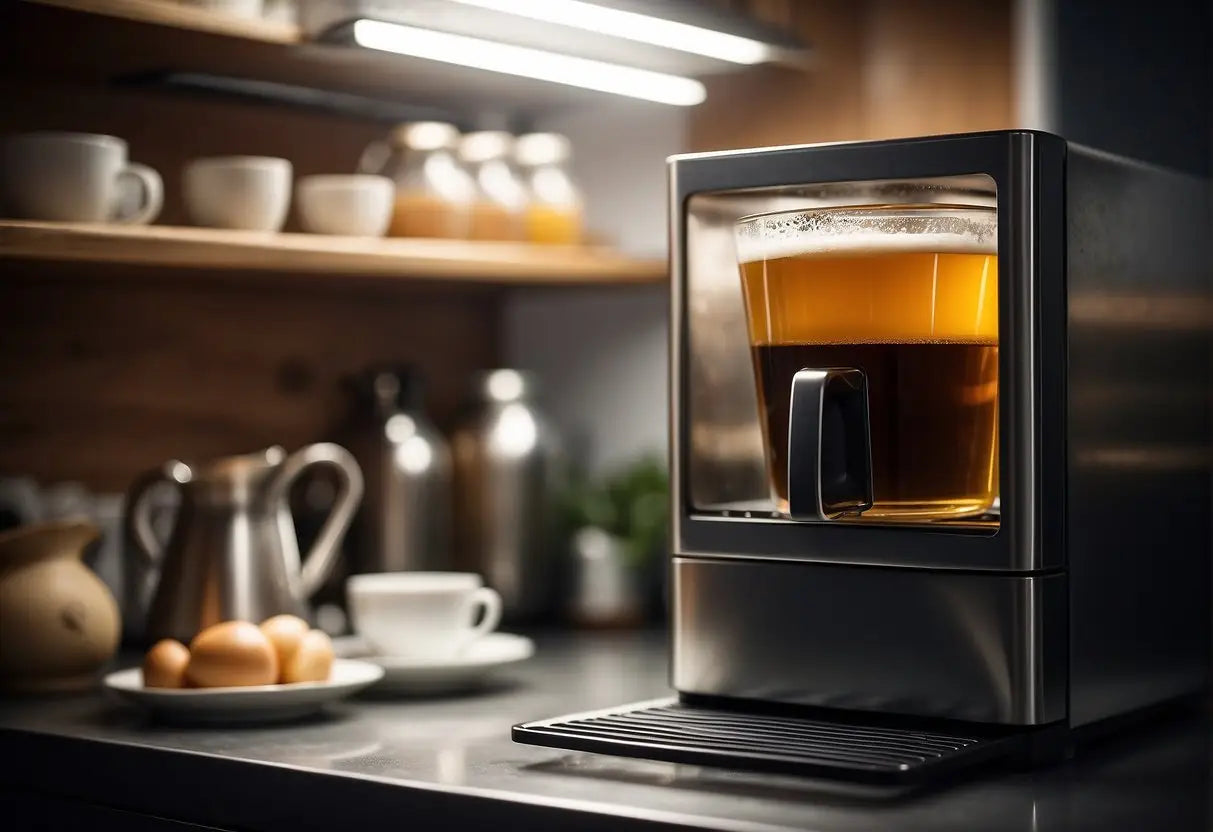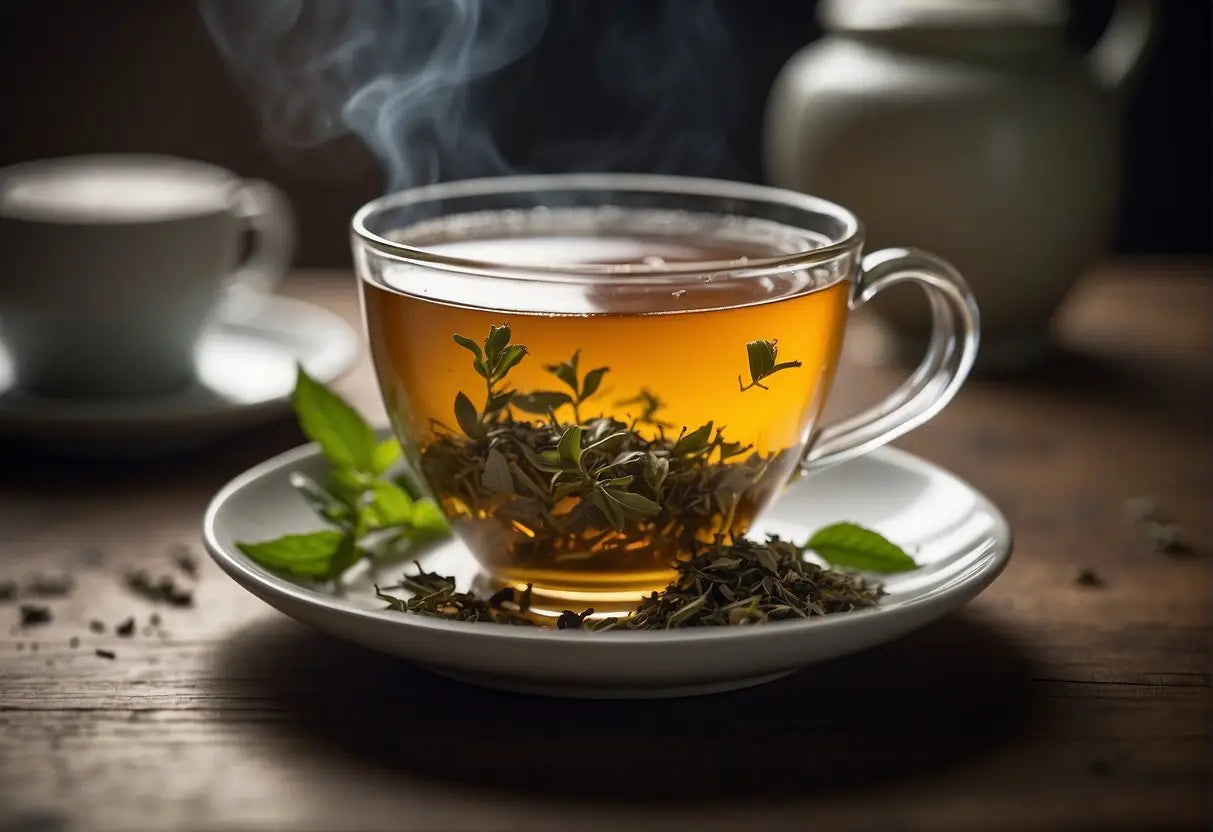Does Tea Have to Be Refrigerated
Storing your tea properly maintains its freshness and flavor. The need to refrigerate tea is guided by its chemical makeup and how refrigeration can impact its quality.
Chemical Composition of Tea
Tea contains a complex blend of compounds including caffeine, tannins, polyphenols, amino acids, and essential oils. The concentration of these chemicals determines the flavor, color, and aroma of the tea. Fresh leaves typically have higher moisture content, making them more susceptible to spoilage, while dried leaves have a longer shelf life.
Effects of Refrigeration on Tea Quality
Refrigeration can slow down the degradation process of tea, especially for:
Bestsellers
- Brewed tea: When you refrigerate brewed tea, you're inhibiting microbial growth that can spoil the drink. However, it should be stored in airtight containers to avoid absorbing other odors.
- Fresh tea leaves: Similar to brewed tea, refrigeration can prolong their usability but may lead to condensation which affects taste and freshness.
For dried tea leaves, avoid refrigeration as the humidity can promote mold growth. Instead, store them in a cool, dark place in an airtight container.
Proper Tea Storage Practices

When storing tea, it is vital to protect it from elements that can degrade its quality. These elements are: light, heat, moisture, and odors.
Follow these guidelines to ensure your tea remains fresh:
Containers
- Use airtight containers to prevent exposure to air.
- Opaque containers are best to block out damaging light.
- Glass jars are not ideal unless stored in a dark place.
Location
- Store your tea in a cool, dark place, like a pantry or cabinet.
- Avoid areas near stoves, ovens, or where sunlight can reach.
Temperature
- Aim to keep your tea at a consistent temperature.
- Avoid storing tea in the refrigerator unless it's a fresh tea like matcha, which can benefit from the cooler environment.
Moisture
- Ensure the area is dry to prevent moisture from seeping in.
- Silica gel packets can be added to absorb any excess moisture.
Odor
- Tea is sensitive to strong odors. Store it away from spices, coffee, or any aromatic substances.
| Do | Don't |
|---|---|
| Choose airtight containers | Use porous containers like paper |
| Keep in a cool, dry place | Store near heat or in direct sunlight |
| Use opaque containers | Use clear containers without dark storage |
| Keep away from strong odors | Store near aromatic foods or spices |
Remember, proper storage is key to maintaining the flavor and quality of your tea.
Types of Tea and Refrigeration Needs
When considering whether to refrigerate your tea, it depends on the type of tea and its preparation state. Here’s a rundown of different types and their refrigeration requirements.
Green Tea
For green tea, freshness is crucial to maintaining its delicate flavor and aroma. If you have loose-leaf green tea or opened tea bags, it's best to store these in an airtight container in a cool, dark place rather than the refrigerator to preserve quality. Refrigeration can introduce moisture, which might lead to mold growth. Conversely, brewed green tea should be refrigerated if not consumed within a few hours to prevent spoilage.
Black Tea
Black tea has a robust flavor and is less susceptible to losing quality when exposed to air. Dry black tea leaves can be stored in your pantry without refrigeration. However, if you prefer to keep them longer than six months, sealing them tightly and placing them in the refrigerator may extend their shelf life. For brewed black tea, refrigeration is recommended as it slows down the growth of bacteria and can keep your tea safe to drink for up to five days.
Herbal Tea
Herbal teas often comprise a variety of ingredients and thus require attentive storage. Dry herbal tea blends should stay in airtight containers away from heat, light, and moisture; refrigeration is generally unnecessary. However, once herbal tea is brewed, you should refrigerate it and drink it within 48 hours to ensure its safety and the preservation of its nuanced flavors.
Oolong Tea
Similar to green tea, oolong tea is best stored in an airtight container at room temperature to maintain its characteristically nuanced taste. Oolong teas are partially oxidized, which makes them less prone to degradation when stored properly. After brewing oolong tea, refrigerate any leftovers and consume within a few days for optimal freshness.
Risks of Improper Tea Storage
When you store tea improperly, it becomes susceptible to various forms of deterioration which can affect its flavor, aroma, and safety. Here are some risks to be aware of:
1. Moisture: Tea leaves readily absorb moisture. If exposed to damp conditions, they can develop mold and mildew. Not only does this make the tea unpalatable, but it can also pose health risks if ingested.
Lao Ban Zhang
- Signs of moisture damage: Musty smell, discoloration of leaves.
2. Odor Absorption: Tea leaves can act like sponges, absorbing odors from their environment. Storing tea near strong-smelling foods or materials can lead to unintended flavor contamination.
- Prevention: Store tea in airtight containers, away from strong odors.
3. Loss of Flavor and Aroma: Tea stored in direct sunlight or warm areas can lose its potency over time. Heat can degrade the delicate oils and aromas that give tea its taste.
- Best Practice: Store tea in a cool, dark place.
4. Pests: Insects and rodents can be attracted to improperly stored tea. These pests can contaminate your tea with their droppings or by simply coming into contact with the tea leaves.
- Signs of pest infestation: Droppings, bite marks, or actual insects/rodents.
5. Staleness: Over time, tea can become stale if exposed to air. Stale tea often has a weak flavor and lacks the vibrancy of fresh tea.
- To Retain Freshness: Seal tea in an airtight container and use it within a reasonable time frame.
By being mindful of these risks, you can take the necessary steps to ensure your tea remains fresh, flavorful, and safe to drink.
Refrigerating Brewed Tea

After brewing tea, refrigeration can help maintain its freshness and flavor. Proper storage is crucial to prevent spoilage and maintain its quality.
Best Practices
When refrigerating brewed tea, always use an airtight container to prevent the absorption of other odors and flavors from your refrigerator. Glass containers are preferable as they are less likely to impart additional flavors to the tea.
- Container Choice: Glass is best; avoid plastic if possible.
- Temperature: Keep your refrigerator below 40°F (4°C).
- Airtight Seal: Use a container with a tight-fitting lid.
Time Frame for Refrigeration
Brewed tea can be kept in the refrigerator for up to 48 hours. It's essential to note that the quality may begin to decline after this period. For iced tea, it's advisable to consume it within 8 hours for the best taste.
- Maximum: 48 hours
- Optimal for Iced Tea: 8 hours
Refrigerating Tea Leaves
When storing your tea leaves, the key is to maintain their freshness and quality. Refrigeration can play a role in this, especially for certain types of tea leaves. Here's what you need to know:
Green and White Teas: These delicate leaves benefit from refrigeration. The cooler temperatures slow down the degradation process, which helps retain their subtle flavors and aromas.
Oolong and Black Teas: These robust leaves are less sensitive, but refrigeration can extend their shelf life. Be sure to tightly seal them to avoid moisture.
Herbal Teas: Varies by ingredients. Check the packaging or consult the supplier for the best storage method.
| Tea Type | Refrigerate? | Notes |
|---|---|---|
| Green and White | Yes | Preserves delicate flavors. |
| Oolong | Optional | Seal tightly to maintain quality. |
| Black | Optional | Refrigeration can extend freshness. |
| Herbal | Varies | Follow supplier's recommendations. |
Remember to store your tea leaves in an airtight container to prevent them from absorbing odors and moisture from the refrigerator. Additionally, let the leaves come to room temperature before brewing to ensure the best flavor.
Signs of Spoiled Tea

When assessing whether your tea has spoiled, you should look for several clear signs. Spoilage can occur in both brewed tea and tea leaves. Here's what to keep an eye out for:
-
Color Changes: If you notice that the color of your tea has darkened or turned murky, this could be a sign of bacterial growth.
-
Unusual Smell: A sour or off smell is a strong indicator that your tea should not be consumed. Fresh tea should have a clean and sometimes aromatic scent.
-
Mold: Any visible signs of mold, such as fuzzy spots or discoloration on the surface, mean the tea is no longer safe.
-
Taste: If you venture a taste and the tea has an unpleasant sharpness or a flavor that is not typical of what brewed tea should taste like, it's best to discard it.
-
Thick or Syrupy Texture: In the case of brewed tea, if the liquid becomes viscous or has a syrup-like consistency, it's past its prime.
To keep your tea from spoiling, it's important to store it properly. Dry tea leaves should be kept in a cool, dark place in an airtight container, while brewed tea needs refrigeration if it's not consumed immediately and should be drunk within a few days.
Remember that proper hygiene and storage are key to extending the life of your tea and preventing the growth of bacteria that can lead to spoilage.
Frequently Asked Questions
Proper storage of tea is essential to maintain its freshness and prevent bacterial growth. This section addresses common queries regarding the refrigeration and safe consumption of tea.
How long can freshly brewed tea stay safe to consume at room temperature?
You can keep freshly brewed tea at room temperature for up to 8 hours. After that, it is advisable to refrigerate it to prevent bacterial growth.
Should iced tea be kept refrigerated after opening?
Yes, you should refrigerate iced tea immediately after opening it to maintain its quality and safety.
Can you drink tea that has been left out overnight?
It's not recommended to drink tea that has been left out at room temperature for more than 8 hours due to the risk of bacterial contamination.
What are the storage recommendations for store-bought iced tea?
Store-bought iced tea should be stored in a cool, dark place before opening. After opening, refrigerate it and follow the expiration date on the packaging for optimal freshness.
Is it necessary to refrigerate Pure Leaf tea after it's been opened?
Yes, Pure Leaf tea should be refrigerated after opening to preserve its quality and prevent spoilage.
Does the refrigeration requirement differ for sweetened and unsweetened iced tea?
Both sweetened and unsweetened iced teas should be refrigerated after opening. However, sweetened iced tea may be more prone to bacterial growth and should be consumed sooner.
← Older post Newer post →











